Looking at the future to the year 2024, the cybersecurity sector is at the forefront. The growth of digital technologies has led to a high-risk scenario in which cyber crimes are on the rise, with enhancements in the techniques used to perform these crimes. In this intellectually vulnerable situation, AI is assuming a significant role in preventing new forms of cyber threats.
In this article, we are going to discuss an interesting topic called The Role of Artificial Intelligence in Cybersecurity 2024
The Current State of AI in Cybersecurity
AI has already made great strides in enhancing cybersecurity actions. New approaches, such as machine learning and anomaly detection systems, and technologies, such as natural language processing, have made it easier for organizations to detect and mitigate threats in the shortest time possible. AI can also be used to perform real-time analysis of big data aimed at identifying patterns and outliers in terms of security threats.
Moreover, due to the increased reports, AI solutions have helped automate recurring tasks to allow the cybersecurity team to work on more valuable tasks. Artificial intelligence is becoming an imperative tool in enhancing the efficiency of cybersecurity by involving it in threat intelligence analysis and the entire process of incident response.
Anticipated Trends in AI Cybersecurity for 2024
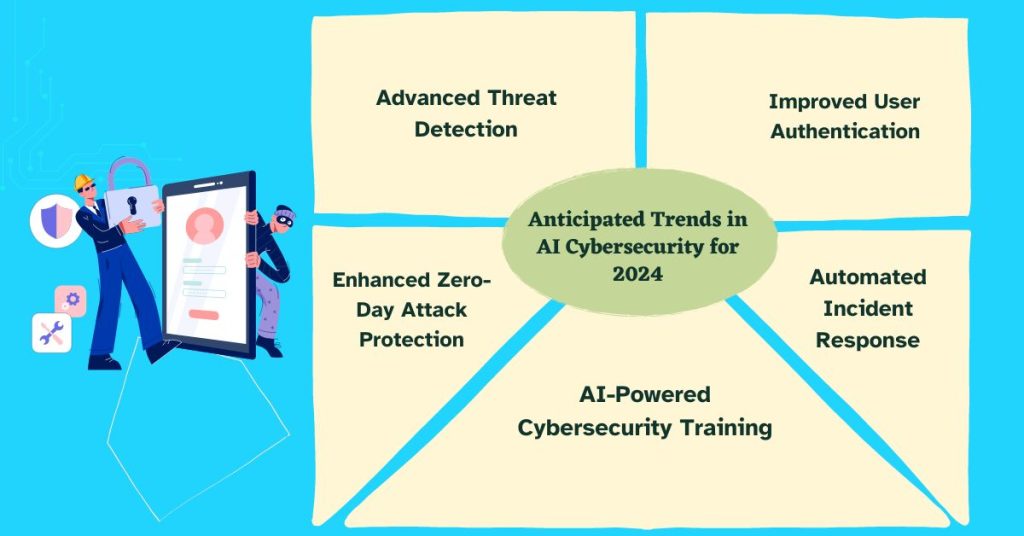
Here we have discussed Anticipated Trends in AI Cybersecurity for 2024 this is going to be more interesting than you think, are you excited to read what we have covered in this, then why late go through each topic below
1. Advanced Threat Detection
Such AI algorithms will continue to develop as organizations become able to identify and prevent advanced cyber threats in real time. Thus, with the help of machine learning models and behavioural analytics, AI systems will advance their ability to detect and combat new threats even further.
2. Enhanced Zero-Day Attack Protection
Zero-day threats, which occur through vulnerabilities that are not available to the vendor, are quite problematic in cybersecurity. By 2024, AI-based approaches will be able to detect and prevent zero-day attacks actively and without the adversary’s knowledge.
3. Improved User Authentication
With the current rise in the use of biometric authentication and behavioural analytics, AI technologies will provide better security in user authentication. Further, through the analysis of the user’s behaviour and physiological features, it will be possible to authenticate the user and prevent them from accessing data to which they have no right.
4. AI-Powered Cybersecurity Training
By 2024, AI will be a key component of cybersecurity training, with advanced scenarios and individualized learning available for security personnel. Implementing the use of AI to identify skill deficits and design training materials relevant to the specific employee increases the readiness of cybersecurity teams to deal with new challenges.
5. Automated Incident Response
New advanced technologies, such as AI incident response tools, will be more common in 2024. These tools will allow organizations to detect, analyze, and contain security incidents automatically. Through the use of AI playbooks and orchestration tools in cybersecurity, it is possible to enhance the ability to counter threats and decrease the effects of cyber threats.
Benefits of AI in Cybersecurity
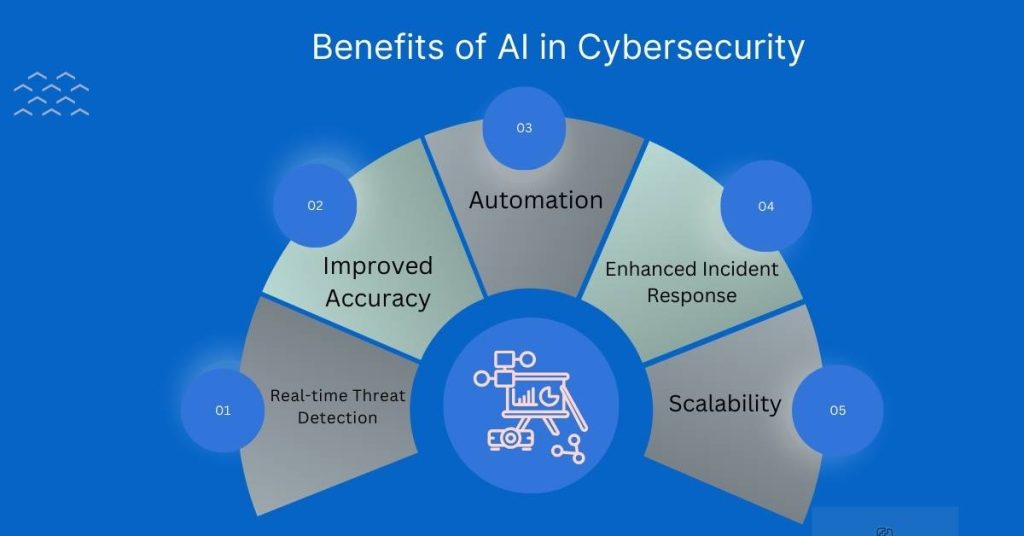
In the above paragraph, we have discussed Anticipated Trends in AI Cybersecurity for 2024, that is okay but don’t you think what the benefits of AI in cybersecurity, yes we know that you are thinking the same, and that’s why we have covered all the benefits of AI in cybersecurity, go through it
1. Real-time Threat Detection
These systems are capable of monitoring networks, systems, and applications on an ongoing basis and identifying anomalies and threats.
2. Improved Accuracy
This will lower the number of false alarms and send the security personnel only relevant and timely alerts, which will save them time.
3. Enhanced Incident Response
Because of this, AI-powered systems are beneficial in that they are capable of responding to threats as they occur, thus minimizing the attack surface and the effect of an attack.
4. Automation
Thus, routine activities can be performed using AI, which will give security specialists more time for more important things, like threat hunting and strategy.
5. Scalability
AI efficiently processes the large volumes of information produced by current organizations due to its ability to offer a bird’ s-eye view.
Applications of AI in Cybersecurity
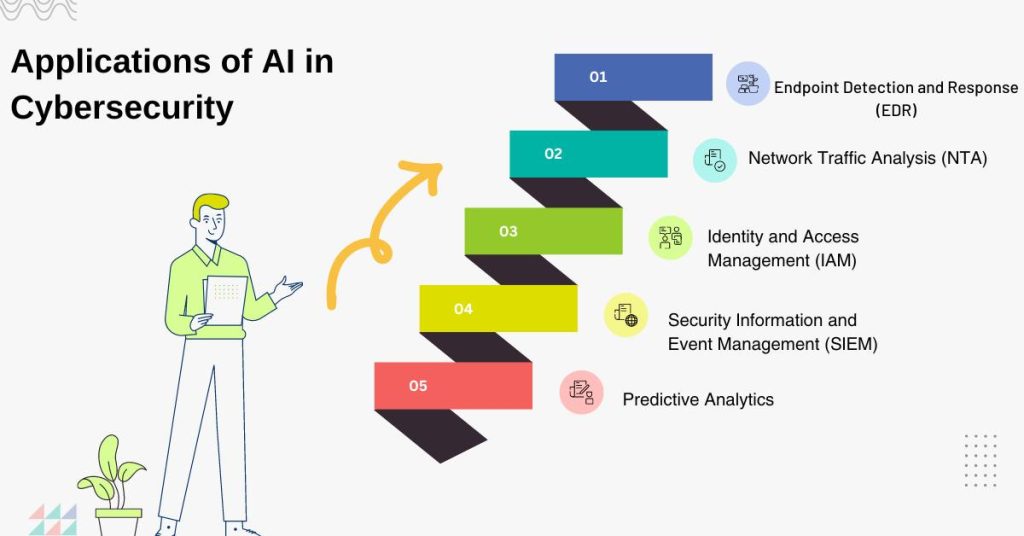
Here with so much research and suggestions by our cybersecurity professionals, we have covered all the applications of AI in cybersecurity
1. Endpoint Detection and Response (EDR)
EDR solutions powered by AI address activities on endpoints and mitigate threats in real time.
2. Network Traffic Analysis (NTA)
The NTA solutions that AI enhances scrutinize the network’s traffic to detect relevant changes as well as possible threats.
3. Identity and Access Management (IAM)
Self-learning IAM solutions obtain data on users’ actions and identify intruders.
4. Security Information and Event Management (SIEM)
SIEM technologies are moreover incorporated into Artificial Intelligence applications, where the collected log data is analyzed through a pattern recognition feature.
5. Predictive Analytics
Another form of security measures is based on AI techniques that enable the analysis of the data collected in the past to define potential weaknesses and the probability of their use in future attacks.
Challenges and Limitations of AI in Cybersecurity
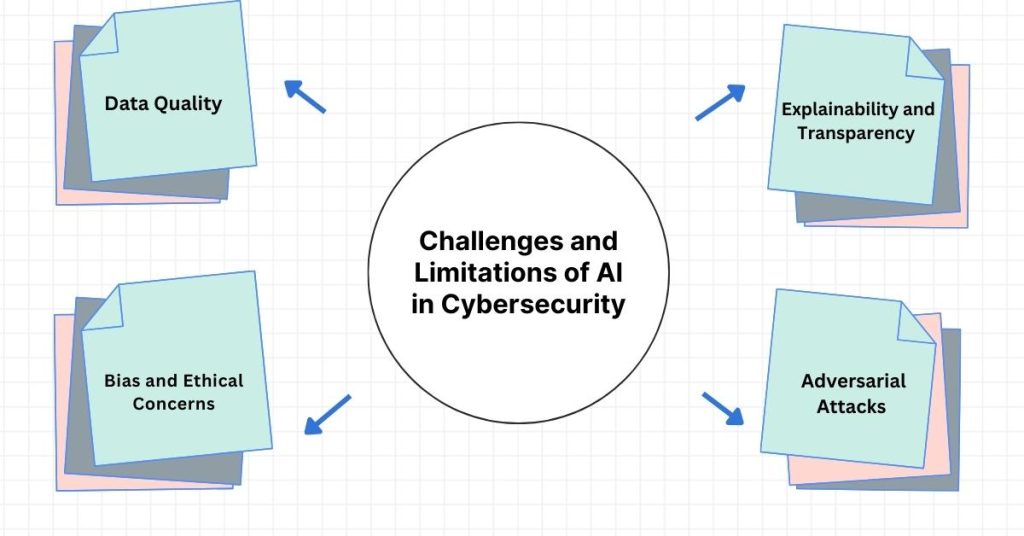
In the above paragraphs, we have discussed about trends and benefits of AI in cybersecurity, now it is time to see the Challenges and Limitations of AI in Cybersecurity
1. Data Quality
AI-based systems rely on good data to work well. If the data pre-processing exercise is well done, the results are correct with false alarms.
2. Bias and Ethical Concerns
Concerns include ethics, including the perpetration of bias, invasion of privacy, and discrimination, as well as problems that are enhanced by the use of AI algorithms.
3. Explainability and Transparency
The application of artificial intelligence can be argumentative, as the work process of AI-powered systems is hard to explain and hold accountable.
4. Adversarial Attacks
Adversarial attacks are another issue that concerns AI systems, as they can be easily created to trick the system.
Future Prospects of AI in Cybersecurity 2024 and Beyond
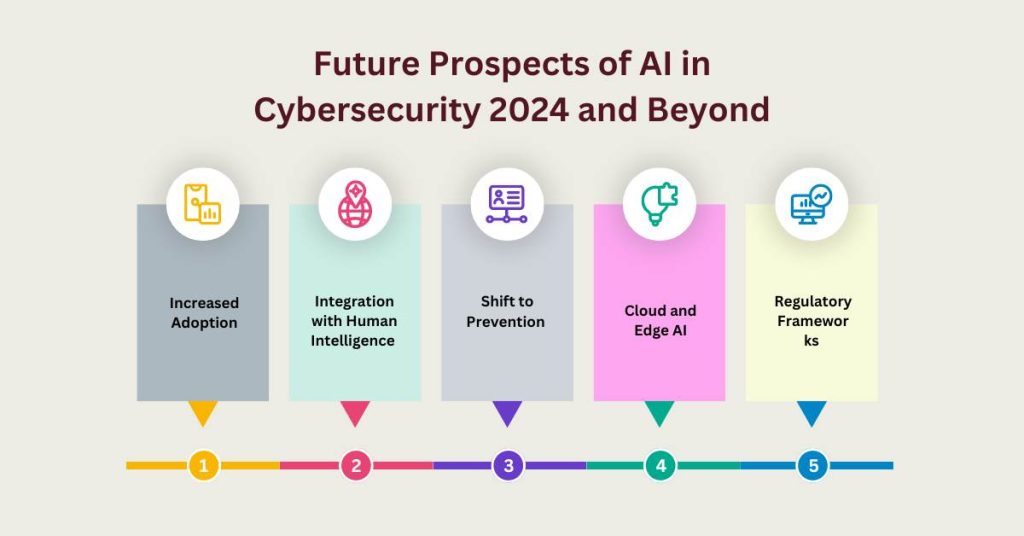
Yes we know that you are thinking about Future Prospects of AI in Cybersecurity 2024, don’t worry we have covered all the prospects that will help you
1. Increased Adoption
We are promoting the implementation of technologies based on artificial intelligence in cybersecurity across companies and organizations.
2. Integration with Human Intelligence
Automation technologies will incorporate artificial intelligence, making human intelligence part of the system, to enhance organizational cooperation and problem-solving.
3. Shift to Prevention
These AI-based systems will work on preventive measures so that the attack surface is minimized and kept at bay.
4. Cloud and Edge AI
The use of artificial intelligence in cybersecurity will also involve using Cloud and Edge computing to monitor and deal with threats in real time.
5. Regulatory Frameworks
From this role, governments and regulatory authorities will develop guidelines on the proper use of AI in cybersecurity.
Conclusion
AI is rapidly becoming the technological cornerstone that can counteract today’s threats and strengthen organizational security. Nevertheless, the advantages of AI-related solutions in the cybersecurity field are obvious. With the threats expanding, AI will become a prominent tool in safeguarding people, enterprises, and states against cybercrime.
In the years to come, specifically in 2024, artificial intelligence shall be employed in more enhanced, interconnected, and pervasive cybersecurity services that define tomorrow’s world of cybersecurity services.
FAQs: The Role of Artificial Intelligence in Cybersecurity 2024
1. What is the primary goal of AI in cybersecurity?
Ans: The primary goal of AI in cybersecurity is to detect and respond to cyber threats in real-time, reducing the attack surface and preventing data breaches.
2. How does AI improve threat detection?
Ans: AI algorithms can analyze vast amounts of data, identify patterns, and detect anomalies in real time, enabling more accurate and timely threat detection.
3. Can AI replace human cybersecurity professionals?
Ans: No, AI is designed to augment human cybersecurity professionals, not replace them. AI handles repetitive tasks, while humans focus on high-value tasks like threat hunting and strategy development.
4. What is the difference between AI and machine learning in cybersecurity?
Ans: AI refers to the broader field of research, while machine learning is a subset of AI that enables systems to learn from data and improve their performance over time.
5. Can AI-powered systems be hacked?
Ans: Yes, AI-powered systems can be vulnerable to attacks, especially if they are not designed with security in mind. Adversarial attacks, data poisoning, and model inversion are potential risks.
6. How does AI address the shortage of skilled cybersecurity professionals?
Ans: AI can help address the cybersecurity skills gap by automating routine tasks, enabling less experienced professionals to focus on higher-level tasks, and providing real-time insights to security teams.
7. What is the role of Explainability in AI-powered cybersecurity?
Ans: Explainability is critical in AI-powered cybersecurity, as it enables organizations to understand the decision-making process and ensure accountability in AI-driven security systems.
8. Can AI-powered systems detect zero-day attacks?
Ans: Yes, AI-powered systems can detect zero-day attacks by identifying patterns and anomalies in real time, even if the attack is unknown or unprecedented.
9. What is the future of AI in cybersecurity?
Ans: The future of AI in cybersecurity is promising, with AI-powered systems expected to become more sophisticated, integrated, and widespread, enabling organizations to stay ahead of emerging threats.












